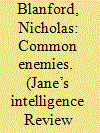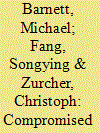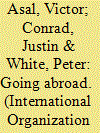|
|
|
Sort Order |
|
|
|
Items / Page
|
|
|
|
|
|
|
| Srl | Item |
| 1 |
ID:
135339


|
|
|
|
|
| Summary/Abstract |
Anarchy was coming to Africa, Robert Kaplan warned in 1994, and a surge in conflict initially seemed to confirm that prediction. With less fanfare, however, after the year 2000, conflict in Africa declined, probably to the lowest levels ever. Recent fighting in Libya, Mali, South Sudan and elsewhere has prompted a new wave of ‘Africa falling apart’ concerns. This article reviews the history and data of conflict in Africa, from pre-colonial times to the present. Historical comparison and quantitative analysis based on the Uppsala Conflict Data Program (UCDP) and Major Episodes of Political Violence (MEPV) datasets on the 1961–2013 period show that Africa has experienced a remarkable decline in warfare, whether measured in number of conflicts or fatalities. Warfare is a relatively low risk to the lives of most Africans. The years 2010–2013 saw an increase of 35 per cent in African battle deaths over 2005–2010, but they still are 87 per cent lower than the 1990–1999 average. Changes in external support and intervention, and the spread of global norms regarding armed conflict, have been most decisive in reducing the levels of warfare in the continent. Consequently, there is no Africa exception to the systemic shift towards lower levels of armed conflict.
|
|
|
|
|
|
|
|
|
|
|
|
|
|
|
|
| 2 |
ID:
136011


|
|
|
|
|
| Summary/Abstract |
Amid the ongoing regional security threat, Hizbullah and the US now have a shared enemy in the Islamic State. Nicholas Blanford examines Lebanon’s ambivalent attitudes towards the anti-Islamic state coalition and explores the potential for co-operation.
|
|
|
|
|
|
|
|
|
|
|
|
|
|
|
|
| 3 |
ID:
134525


|
|
|
|
|
| Summary/Abstract |
There is considerable evidence that peacebuilding operations are more likely to reproduce important elements of the status quo than they are to propel post-conflict states toward a liberal democracy. In contrast to existing theories that focus on the resources available to peacebuilders or the degree of damage caused by the war to explain the outcome, we highlight the interaction between international and domestic actors. Specifically, we conceive of peacebuilding as a strategic process involving peacebuilders, a postwar government, and other local elites. The equilibrium results show that this process typically concludes in a compromised peacebuilding outcome. This is not surprising when the policy preferences of the actors diverge, but the results also hold when domestic elites prefer a liberal democracy to the status quo. Why? Primarily, because postwar governments are rewarded by relatively impatient peacebuilders with more resources than they would otherwise receive. Additionally, if there exists a secondary elite with veto power, a compromised outcome becomes even more likely. We illustrate these findings with reference to post-1989 peacebuilding operations. Although peacebuilding might not work as it is intended, in the conclusion, we argue that it is better than the alternatives and propose a more realistic measure of peacebuilding success.
|
|
|
|
|
|
|
|
|
|
|
|
|
|
|
|
| 4 |
ID:
137085


|
|
|
|
|
| Summary/Abstract |
In contrasting UN with EU democracy promotion discourses, the article contributes to the debate on the substance of EU democracy promotion by approaching the question of ‘democratic substance’ from the vantage point of sovereignty. For its analytical framing, it draws on relevant aspects of Foucault's work on power. The article suggests that, due to their diverging obligations to sovereignty, the substance of democracy promotion in UN discourses revolves around an institutional-centric understanding, whereas in EU discourses we see a significant reconceptualization of democracy as a norms-based concept. The latter does not aim at the government of society but the ethical self-governance of socially embedded individuals. It is argued that, with the decreasing purchase of democracy as a universal political project and the growing concern with local contexts, the EU's norms-based conception emerges as better equipped to adapt to contemporary challenges of governing. The article concludes with raising some doubts about the democratic promise and potential of the democratic rationality underpinning EU discourses. Democracy, participation and political change are no longer conceived in terms of shaping and influencing public agenda but refer to socially shaping and influencing subjective perceptions and behaviours.
|
|
|
|
|
|
|
|
|
|
|
|
|
|
|
|
| 5 |
ID:
136002


|
|
|
|
|
| Summary/Abstract |
Scientist redirection-the process of shifting employees of foreign weapons of mass destruction (WMD) programs to peaceful endeavors-has long been an important piece of U.S. Cooperative Threat Reduction (CTR) programs. Its goal has been to reduce the potential for scientists and engineers employed in WMD programs to disseminate their knowledge to other countries or to nonstate actors.
By assisting in the transition of WMD experts to peaceful employment, scientist redirection programs reduce the likelihood that these individuals will be targets of efforts to buy their expertise. In their simplest form, these programs provide a sense of hope for the future because the desperation associated with sudden unemployment can be a strong incentive for participation in nefarious activities.
|
|
|
|
|
|
|
|
|
|
|
|
|
|
|
|
| 6 |
ID:
137087


|
|
|
|
|
| Summary/Abstract |
This piece examines the substance of EU democracy promotion from a comparative point of view and from a perspective placing under inquiry the meaning of the idea of liberal democracy itself. Instead of assuming that the democratic ideal that the EU promotes (‘liberal democracy’) has a clear, fixed meaning, the article examines in detail what actually constitutes the ‘ideal of democracy’ at the heart of EU democracy promotion, and compares this vision to that which informs the democracy promotion of the US. It argues that interesting differences, and shifts and oscillations, in the models of liberal democracy that the EU and the US promote exist and that these are important to note in order for us to fully appreciate how the substance of EU and US democracy support can be shaped by conceptual and ideological debate on the meaning of democracy. This dynamic is particularly relevant today, in the context of the recent attempts to develop transatlantic dialogue on democracy support. This dialogue, it is suggested, plasters over some subtle but important ideological cracks over what is meant by democracy in EU and US democracy support.
|
|
|
|
|
|
|
|
|
|
|
|
|
|
|
|
| 7 |
ID:
134271


|
|
|
|
|
| Summary/Abstract |
This article is an inquiry into the relationship between diplomacy and public imagination in world politics. Neither the conventional conceptions of diplomacy as the art or practice of negotiations among groups or states, nor more critical meditations on the mediation of conflictual narratives, it is argued, can adequately explain the very subjective foundations of diplomacy as a normative practice in world politics. This glaring oversight is in large part due to the lack of engagement with the varied contours of historical meaning and memory that condition human thoughts and relations in world society. Diplomacy, I argue, is very much implicated in the normative dictates of public imagination: namely, the public understanding of history which arises from the exclusionary—and hence often conflicting—cultural narratives about nationhood, justice, language, rights, personhood, et cetera that remain the perennial facts of human relations in world society. As such, the practice of diplomacy can be reconceived as a paradox: an intervention into, and an enabler of, exclusivist narrations of public imagination in world society.
|
|
|
|
|
|
|
|
|
|
|
|
|
|
|
|
| 8 |
ID:
134559


|
|
|
|
|
| Summary/Abstract |
China is still overall a global free-rider on a system whose original creators and beneficiaries cannot now afford to maintain without help. The question that cannot now be answered is what price the West and the U.S. in particular will be prepared to pay for help.
|
|
|
|
|
|
|
|
|
|
|
|
|
|
|
|
| 9 |
ID:
134538


|
|
|
|
|
| Summary/Abstract |
In spite of geographic proximity and a number of shared interests, the European Union and Libya have a history of strained relations. The war of 2011 provided an opportunity for a fresh start, but so far neither side has been able to reap benefits from an entirely new political situation. Instead, Libya’s difficult internal situation has not only slowed down the process of rapprochement, but also increased EU concern. At a time when cooperation becomes a necessity rather than a choice, Libya is now down-spiralling into implosion at the levels of security, bureaucracy and economy, to the point where it cannot absorb the offers being made.
|
|
|
|
|
|
|
|
|
|
|
|
|
|
|
|
| 10 |
ID:
134537


|
|
|
|
|
| Summary/Abstract |
Seen through the eyes of Syrian activists and other observers based in the Middle East, EU policy towards Syria could in some ways appear inconsistent and ambiguous. In Brussels, EU representatives remind us that the Syrian crisis is the most difficult one the European Union has had to face so far, for the unprecedented scope of the humanitarian catastrophe, its geographic proximity to the Union’s borders, and the difficulties in deciphering a fluid and multi-dimensional conflict. After more than three years since the eruption of violence, the EU is trying hard to play a pivotal role in the Syrian issue, despite the complexity of balancing its institutions, the different political sensibilities of its 28 member states, and the pressures exerted by influent external actors.
|
|
|
|
|
|
|
|
|
|
|
|
|
|
|
|
| 11 |
ID:
136869


|
|
|
|
|
| Summary/Abstract |
During the first decade after the 9/11 attacks, the European Union (EU) has developed into an international counter-terrorism actor in its own right, a role increasingly accepted by third countries. This is a result of many influences, including a more favourable legal basis after the Amsterdam Treaty reforms; enhanced institutional capabilities, such as the growing importance of the Counter-Terrorism Coordinator; the use of a broad range of instruments, such as intelligence sharing; and the application of geopolitical priorities, guided by meetings at the United Nations and the Council of Europe (among other fora). At the same time, the EU's counter-terrorism role has remained subsidiary, both legally and politically, to that of its member states. Furthermore, a lack of its own operational capabilities, its institutional complexity, and its problems of cross-policy coordination continue to act as powerful constraints on the EU's counter-terrorism responsibilities.
|
|
|
|
|
|
|
|
|
|
|
|
|
|
|
|
| 12 |
ID:
134535


|
|
|
|
|
| Summary/Abstract |
At the time of writing, representatives from Iran and the E3/EU+3 are trying to work out an agreement that will guarantee that Iran’s controversial nuclear programme, widely suspected of having a military purpose, serves only peaceful ends. As the negotiations enter their most crucial phase, the time is ripe to attempt an assessment of the role played by the only actor, besides Iran, that has been on stage since it all began over ten years ago: Europe. Throughout this long drama, Europe’s performance has had some brilliant moments. Yet the quality of its acting has decreased as a new protagonist, the US, has come on stage. Overall, the Europeans’ record is positive, albeit not entirely spotless.
|
|
|
|
|
|
|
|
|
|
|
|
|
|
|
|
| 13 |
ID:
136870


|
|
|
|
|
| Summary/Abstract |
The Lisbon Treaty, which entered into force in 2009, considerably reinforced the powers of the European Parliament. This article examines to what extent the European Parliament has become an important actor in EU counter-terrorism by focusing on the external dimension of this policy. It also analyses the impact that this potentially changing role has had on the external dimension of EU counter-terrorism. This article puts forward two inter-related claims. Firstly, the role of the European Parliament in the external dimension of EU counter-terrorism has significantly grown in recent years. Following the entry into force of the Lisbon Treaty in December 2009, the European Parliament has become a fully-fledged actor in the external dimension of EU counter-terrorism. Secondly, the reinforcement of the role of the European Parliament has also led to a strengthening of both accountability and oversight in the external dimension of EU counter-terrorism, although there are still some limitations in that respect.
|
|
|
|
|
|
|
|
|
|
|
|
|
|
|
|
| 14 |
ID:
134976


|
|
|
|
|
| Summary/Abstract |
Past decades have witnessed a shift in international cooperation toward growing involvement of transnational actors (TNAs), such as nongovernmental organizations, multinational corporations, and philanthropic foundations. This article offers a comprehensive theoretical and empirical account of TNA access to IOs. The analysis builds on a novel data set, covering formal TNA access to 298 organizational bodies from fifty IOs over the time period 1950 to 2010. We identify the most profound patterns in TNA access across time, issue areas, policy functions, and world regions, and statistically test competing explanations of the variation in TNA access. The central results are three-fold. First, the empirical data confirm the existence of a far-reaching institutional transformation of IOs over the past sixty years, pervading all issue areas, policy functions, and world regions. Second, variation in TNA access within and across IOs is mainly explained by a combination of three factors: functional demand for the resources of TNAs, domestic democratic standards in the membership of IOs, and state concerns with national sovereignty. Third, existing research suffers from a selection bias that has led it to overestimate the general importance of a new participatory norm in global governance for the openness of IOs.
|
|
|
|
|
|
|
|
|
|
|
|
|
|
|
|
| 15 |
ID:
135302


|
|
|
|
|
| Summary/Abstract |
The Winter Olympic Games in Sochi and the annexation of Crimea were two major international events in which Russia engaged in early 2014. In spite of all the divergence in the logic underpinning each of them, four concepts strongly resonate in both cases. First, in hosting the Olympics and in appropriating Crimea, Russia was motivated by solidifying its sovereignty as the key concept in its foreign and domestic policies. Second, the scenarios for both Sochi and Crimea were grounded in the idea of strengthening Russia as a political community through mechanisms of domestic consolidation (Sochi) and opposition to unfriendly external forces (the crisis in Ukraine). Third, Sochi and Crimea unveiled two different facets of the logic of normalisation aimed at proving – albeit by different means – Russia’s great power status. Fourth, one of the major drivers of Russian policy in both cases were security concerns in Russia’s southern flanks, though domestic security was also an important part of the agenda.
|
|
|
|
|
|
|
|
|
|
|
|
|
|
|
|
| 16 |
ID:
134982


|
|
|
|
|
| Summary/Abstract |
Existing literature on contentious political movements has generally focused on domestic political activity. Using the new Minorities at Risk Organizational Behavior–Middle East data set (MAROB-ME), which contains organization-level data for 104 ethnopolitical organizations in the Middle East and North Africa, we analyze the decision of both violent and nonviolent organizations to engage in political activity transnationally. Among the results, we find that diaspora support is associated with transnational nonviolent protest, whereas foreign state support and domestic repression increase the use of transnational violence. The most robust finding, however, is that participation in the domestic electoral process consistently reduces the likelihood that an organization will engage in any political activity abroad.
|
|
|
|
|
|
|
|
|
|
|
|
|
|
|
|
| 17 |
ID:
135295


|
|
|
|
|
| Summary/Abstract |
Comparisons of peacebuilding with historic practices of imperialism are common, but these comparisons have sustained a hegemonic antagonism between humanitarian and imperialist interpretations of international peace intervention. This article argues that this common framing externalises the problem of intervention, romanticises local resistance, and forecloses to investigation the articulation between militarised peace practices and transnational capitalist relations. To do so, the article analyses the case of Francophone Africa, thus providing a context that has been left unexplored in peacebuilding debates. By bringing back in the historicity of particular Franco-African imperial experiences into peacebuilding research, the article reveals the militarisation of politics, transnational elite networks, and the dominant intellectual predispositions that work to reproduce the legitimacy of hegemonic practices of ‘peace’ interventionism. In the last section, the article analyses the debates over the UN-French 2011 intervention in Côte d'Ivoire to reveal the connections between the ethics of humanitarian interventions and the political economy of imperialism. The article concludes that the imperial legacy of peacebuilding is found in old capabilities, new organising logics, and specific practices and power relations and that to focus on the humanitarian-imperialist antagonism caricatures the relationships between ‘local’ and ‘international’ actors.
|
|
|
|
|
|
|
|
|
|
|
|
|
|
|
|
| 18 |
ID:
136994


|
|
|
|
|
| Summary/Abstract |
The present case study examines whether international actors constitute an obstacle or opportunity for environmental campaigns against the siting of controversial facilities. Drawing upon field research carried out in Beijing, China, from 4 March until 10 April 2013, this article investigates the siting of the Nangong waste incinerator between the project’s announcement (2010) and conclusion of planning (2013). Specifically, this article studies the relations between a group of local environmental non-governmental organizations (ENGOs) and the German state-owned development bank Kreditanstalt für Wiederaufbau while grounding its inquiry in propositions based on a reading of fragmented authoritarianism. In the course of the analysis, it is suggested that the small potential for de-escalating tensions in the ENGO–international actor alliance is dwarfed by ENGOs’ excessive expectations projected upon international actors, competition over narratives as well as a limited scope for political manoeuvring as a result of diplomatic, contractual and commercial obligations. Consequently, the involvement of international actors in NIMBY (not in my backyard) controversies does not present an opportunity for environmental campaigns.
|
|
|
|
|
|
|
|
|
|
|
|
|
|
|
|
| 19 |
ID:
134825


|
|
|
|
|
| Summary/Abstract |
The global environmental movement is a vast. largely LlnC00[‘(environmental movement that spans all strata of society. Included \\llllln its ranks LITL ifiolificians at the national. regional and local levels; radical international actors ; writers; lobbyists: middle school students who run awareness fiampaigns; philosophers and communities. In recent years. the mm cmcm has had considerable influence on all spheres of life in the intcmmionztl In this paper I will explore some of the lessons that can be tlruun from the movement to be applied to transforming the conflict in Israel- Palestine.
|
|
|
|
|
|
|
|
|
|
|
|
|
|
|
|
| 20 |
ID:
134596


|
|
|
|
|
| Summary/Abstract |
This paper evaluates external factors that shape the establishment of transparent institutions, with a focus on the work of the Extractive Industries Transparency Initiative in Azerbaijan. The evidence from Azerbaijan suggests that in hydrocarbon-rich countries, genuine reform can only be achieved through the combined efforts of external and domestic actors. More specifically, the paper argues that transparency promotion from abroad relies on the existence of political accountability and genuine anti-corruption measures in order to work as intended. The case of Azerbaijan illustrates the potential limitations of external remedies to the ‘resource curse’ and emphasises the significance of accountability in political regimes.
|
|
|
|
|
|
|
|
|
|
|
|
|
|
|
|
|
|
|
|
|